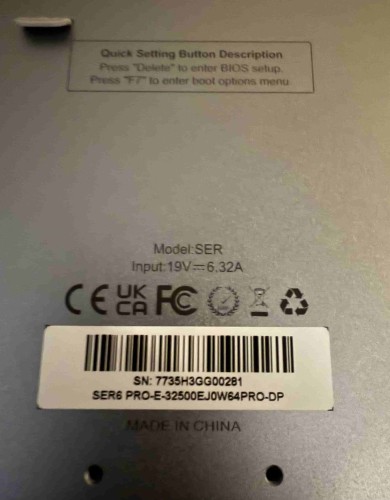SN as requested

The enclosure is https://www.hypershop.com/products/hyperdrive-next-usb4-nvme-ssd-enclosure
Its specs are listed:
USB4 40Gbps Host Connection
M.2 NVMe PCIe Gen 4/3 SSD
Supports up to 4TB
The chipset it uses, the ASM2464PD, has these features which SHOULD work on the USB4 port:
General Features
USB4/Thunderbolt to PCI Express NVMe SSD Bridge.
Integrated two USB 20Gbps PHYs.
Integrated UFP CC Logic for USB Type-C cable orientation and detection.
Integrated BMC PHY for PD fixed 5V UFP/Sink mode.
VCCH/VCCL/VDD Power Supply.
Support SPI interface with External ROM for Customized RAM Code.
Support I2C and GPIOs and UART Interface.
Local 25MHz Crystal.
Universal Serial Bus Features
Support up to USB4/Thunderbolt Gen3 x2 with USB 3.2 and USB 2.0 (backward compatibility).
Support BOT and UAS Protocol.
Support USB Link Power Management.
Support USB Hot Plug.
Support Spread Spectrum Clock Control.
Support UNMAP Command Set.
Support SCSI Vendor Specific Command Set.
Compliant with Universal Serial Bus 4 (USB4 ®) Specification Rev. 1.0 (including Interoperability with Thunderbolt™ 3 (TBT3) Systems)
Compliant with Universal Serial Bus Type-C Cable and Connector Specification Revision 2.1
Compliant with Universal Serial Bus Power Delivery Specification Revision 3.1 Version 1.3
PCI Express Features
Support up to PCI Express Gen4 x4.
Support PCI Express NVMe SSD.
Support Spread Spectrum Clock Control.
100MHz Differential Reference Clock Output.
Support Various Types of PCI Express Socket including M.2, U.2, U.3 and CFexpress.
Support PCI Express Link Power Management.
Compliant with PCI Express Base Specification Rev. 4.0
Compliant with PCIe M.2 Specification Rev. 1.1
NVM Express Features
Support NVMe Power Management.
Support NVMe: SCSI Translation Reference Rev. 1.5
Support NVMe Error Reporting & Recovery.
S.M.A.R.T Drive Monitoring.
Compliant with NVM Express Base Specification Rev. 1.4c
The website also states:
“To achieve the 40 Gbps transfer speed, you should use a USB 4.0 or Thunderbolt 4 interface and update the OS build and NVM FW version to the latest version.”
I realized that the steps from the first support comments dealt with OS recognizing the enclosure. However, it isn’t recognized in the
BIOS either. When connected and in the BIOS, it isn’t showing up as a possible drive. So, steps within the OS wouldn’t help to fix the issue.
I think the BIOS itself needs to recognize the drive before the OS even has a chance. Maybe a BIOS update that includes the latest
NVM FW version?
Thanks again for your help and assistance to get this fixed. 🙏